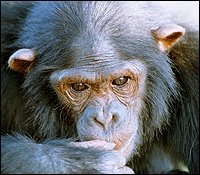Interesting piece of news this one:
 Infants as young as 18 months show altruistic behaviour, suggesting humans have a natural tendency to be helpful, German researchers have discovered.
Infants as young as 18 months show altruistic behaviour, suggesting humans have a natural tendency to be helpful, German researchers have discovered.In experiments reported in the journal Science, toddlers helped strangers complete tasks such as stacking books. Young chimps did the same, providing the first evidence of altruism in non human primates.
As a fully paid up member of the Bonobo fanclub I can only say I welcome the news that both humans and chimps have 'bonobo-like' qualities, qualities I hasten to add which now seem to have been favoured by adaptive evolution. There is useful coverage in Scientific American:
Alicia Melis of the Max Planck Institute for Evolutionary Anthropology in Leipzig, Germany, and her colleagues presented chimpanzees at a sanctuary in Uganda with a cooperative challenge. To reach a food tray from behind bars, a chimpanzee had to pull on two ends of a rope threaded through metal loops on the tray. If the chimpanzee simply pulled on one end, the rope would slip the loop. If, however, the chimpanzee unlocked the door to an adjacent room, released a fellow chimp, and cooperated with it to pull on both ends of the rope at the same time, both would be rewarded with the food on the tray..
Here,s an interesting paper from Tomasello: Understanding and sharing intentions: The origins of cultural cognition, and here's the research project home page, and here's a link to Joan Silk's webpage, Silk also works with Chimpanzees.
Also, don't miss these two simple videos comparing human and chimp resonse times to someone in need.
 "I think it's extremely interesting that these very young children are behaving in a helpful way," says University of California, Los Angeles, biological anthropologist Joan Silk, who led the food-lever study. "It suggests that just like infants are wired up to imitate, they're wired up to help." As for the chimps, the new experiments suggest that they may have a more altruistic nature than the food experiments suggested, Silk says. "It may be that when chimps see food, they can only think of themselves." An alternative explanation, she says, is that chimps may be more likely to help a human caretaker than one of their own."
"I think it's extremely interesting that these very young children are behaving in a helpful way," says University of California, Los Angeles, biological anthropologist Joan Silk, who led the food-lever study. "It suggests that just like infants are wired up to imitate, they're wired up to help." As for the chimps, the new experiments suggest that they may have a more altruistic nature than the food experiments suggested, Silk says. "It may be that when chimps see food, they can only think of themselves." An alternative explanation, she says, is that chimps may be more likely to help a human caretaker than one of their own."




No comments:
Post a Comment